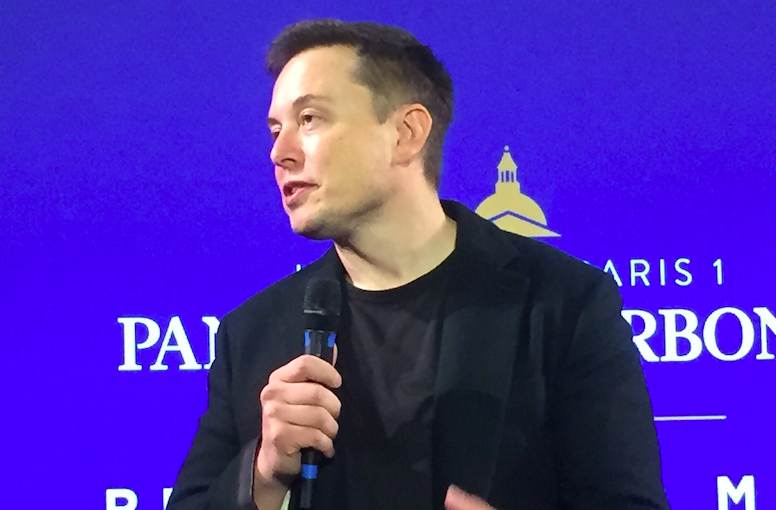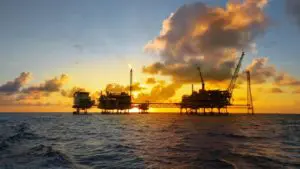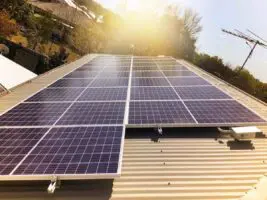Tesla co-founder and CEO Elon Musk has called for a carbon price to be imposed throughout the world and the removal of hidden subsidies supporting fossil fuels, in moves he said would to cut in half the time need to transition to a decarbonised world based mostly around renewable energy and storage.
If the hidden fossil fuel subsidies were removed, and a carbon price imposed, he said, that transition could happen in a short a period as 15-20 years. But it could take double the time if the fossil fuel industry was not required to pay for its impacts on the environment.
Musk, the founder of the company that is making high performance electric vehicles and is poised to roll out its first home battery storage systems in Australia – its first global market – appeared at the Sorbonne University to coincide with the UN climate conference in Paris.
He spent around 45 minutes speaking to students about the climate change, its implications and clean energy solutions, and later spent about the same time taking questions from journalists on the same issue.
He told the students that if fossil fuel subsidies were not removed, the best outcome to be hoped for was just a slowing down on the transition that he saw as inevitable.
The worst outcome, however was “more displacement and destruction than all of the wars in history combined. That would be the dumbest experiment ever. Why would you do this?
In total Musk spoke for an hour and a half mostly in questions. There were no great revelations about his business plans, new technologies, or products, but here is a quick wrap of the main themes.
On Australia being first market for battery storage
The first domestic sized Tesla Powerwall battery storage devices are due in Australia this month, and training for installers, wholesalers and utility folk has been held over the last two weeks in Melbourne, Adelaide and Brisbane.
“We are expecting a lot of interest in the Powerwall from Australia, Musk said.
RenewEconomy asked Musk why the Australian market was so attractive. We kind of know the answer – high solar penetration, great sunshine, high electricity prices and the tariff structure, but this is what he said:
“Australia has such a large percentage of homes with solar panels, and Australia’s correctly prices energy at the consumer level, they pay more at peak times than at non-peak. That means that the economic incentives are aligned for consumers for battery storage. Australia has good rules.”
He may be over-egging the ratio of consumers with peak and non peak pricing, but the principal stands. Australia is expected to be the first mass-market battery storage market in the world, which is why Tesla and others are launching their products here.
Musk also confirmed that the 100kWh Powerpack would also be brought to Australia, along with the PowerWall, although the utility-scale product would pretty much suit any market, while the PowerWall would only suit certain markets, at least initially.
The type of carbon tax
Musk suggested a “revenue neutral” carbon price, with any price rises possibly offset by a cut in VAT (GST). Now, where did he get the idea of a revenue neutral carbon price from? Australia had one for all of two years, before the Coalition was elected and dumped what it dumped a “great big tax on electricity.”
“Governments that depend on fossil fuels can just change their tax structure. They can collect the same amount of taxes, but weighted against things which most people would say were bad.”
He wanted a strong signal to come out of the Paris climate talks. “Hopefully what comes out of Paris, they will put their foot down and show companies that they should know that this will happen (carbon pricing).”
Musk also suggested governments should work hard to favour start-ups, and seek to replicate the culture of Silicon Valley where it was OK to fail. “If you try to create a company and fail, there is no stigma to it,” he said. “That is super important.”
On his preferred energy mix
Solar, he said, could power the world. One small slice of Spain could provide all the power needed for Europe, and a small slice of Nevada could do the same for the US. In reality, the world would need a mixture of solar, wind, hydro and geothermal, with maybe some nuclear in countries that are stable and already have it.
Musk said he was a supporter of nuclear energy, but later narrowed that down to countries that already had nuclear power. He didn’t think Germany’s decision to exit nuclear was such a good idea, but Musk did not recommend nuclear for countries exposed to natural disasters such as earthquakes, hurricanes and flooding. He thought that nuclear fusion was at least 30 years away.
“Solar is the best technology,” he said. “The sun is giant fusion explosion, and it turns up every day. And you can store its energy in batteries and use it at night.”
And in developing countries the mixture of solar and storage would enable them to “leapfrog the fossil fuel and huge grids. “You could have remote villages with solar panels and a battery pack, just like mobile phones, a lot of countries just didn’t do the landlines, they skipped right over landlines.”
Future of storage:
The world won’t run out of lithium and batteries will be fully recyclable. He said battery storage had huge potential even without renewables to make the grid more efficient and shut down the most polluting plants.
“The world has two or three many times power plants than it needs. If you can store the power with Tesla PowerPacks (the company’s grid scale 100kWh product), you can shut down the worst power stations in the world.
“A lot of people don’t appreciate that.”
Transformation of the transport sector
Musk acknowledged that Tesla was a small company, building 50,000 cars in a market that builds 100 million vehicles a year, and had total stock – in cars and trucks – of more than 2 billion. With just one per cent of the market, it would take years to effect a transition.
Even with electric vehicles accounted for half the new cars in the world, it would represent just 2.5 per cent of total stock. “Even if we went super- hard it would take a long time, maybe 10 to 20 years before we see significant change.”
But Musk repeated his disdain of fuel cell cars, saying that electric vehicles powered with solar were three or four times more efficient than they fuel cell rivals.
Fossil fuel lobbyists
On several occasions Musk compared the fossil fuel industry to the tobacco lobby, find a few scientists willing to go against the mainstream, call it a “debate”, and use that to create doubt.
“We cannot beat the oil and gas industry on lobbyists. Exxon makes more profit than the entire solar industry. You cannot win on money alone.” Which is why he said he wanted to talk to students, rather than the climate conference. Go and talk to your politicians, talk to your friends, and fight propaganda. You cannot win on money alone.”.
He estimated the level of fossil fuel subsidies at more than $US5 trillion, a number used by the International Monetary Fund but dismissed by Australian prime minister Malcolm Turnbull this week as “unhelpful”. Musk described the level of subsidies as “madness”.












